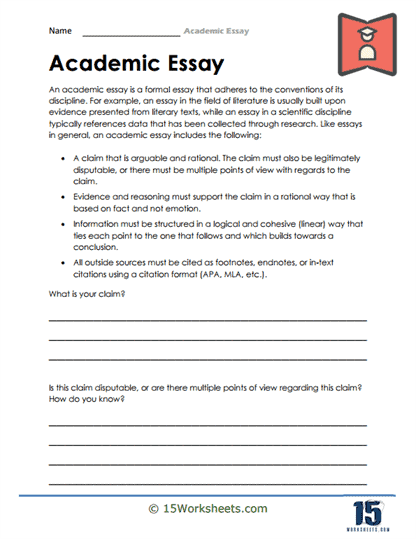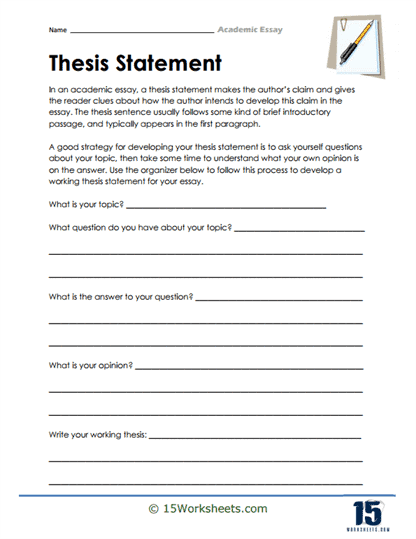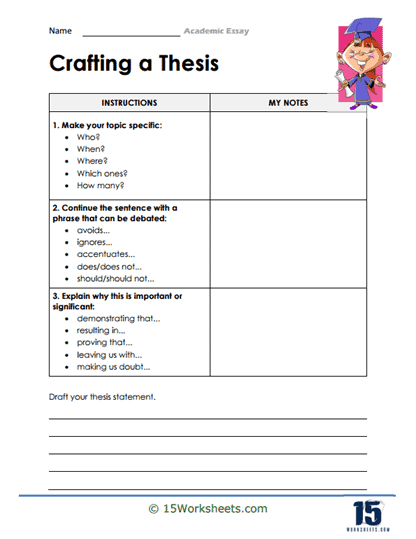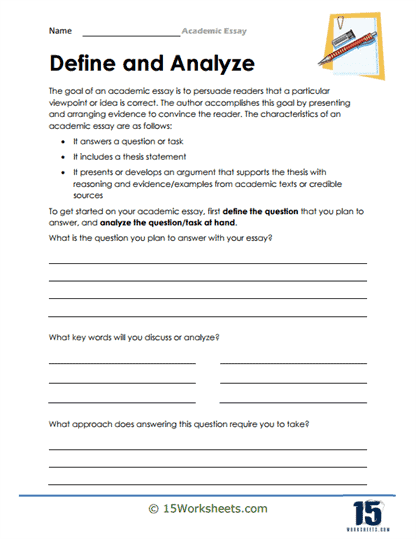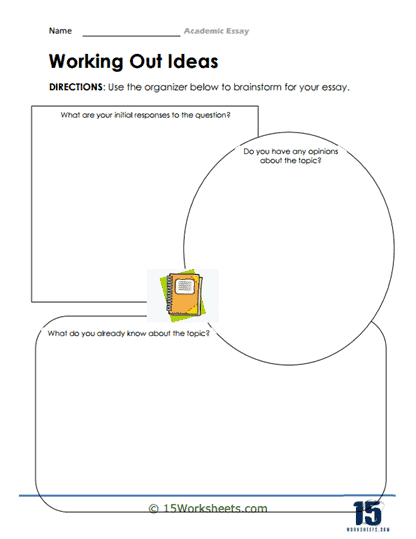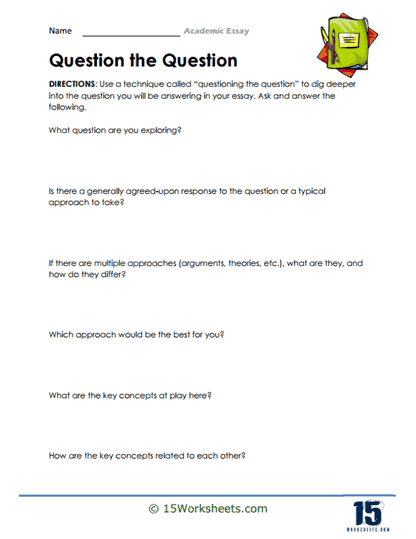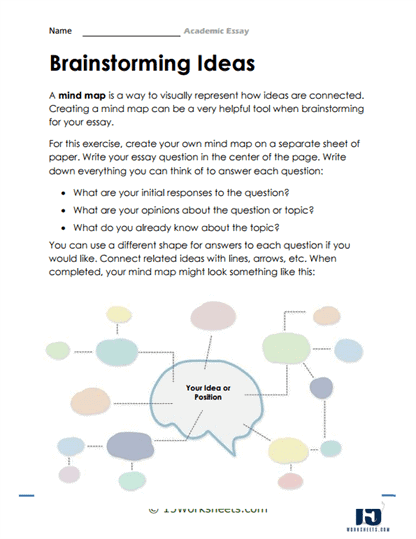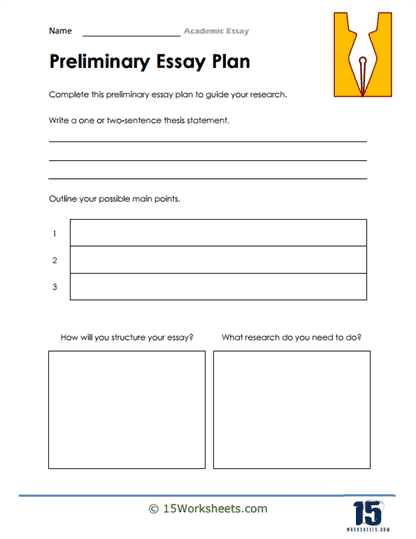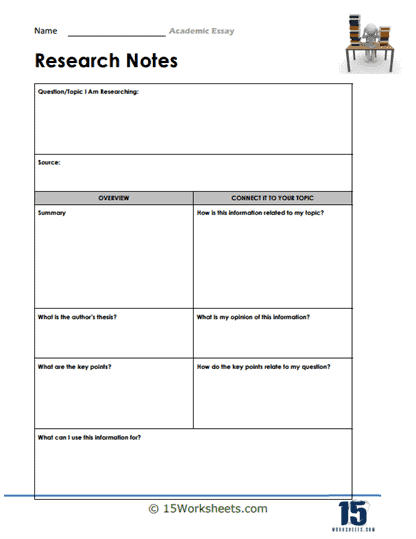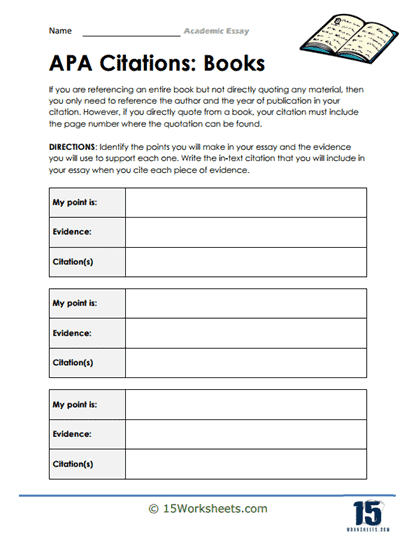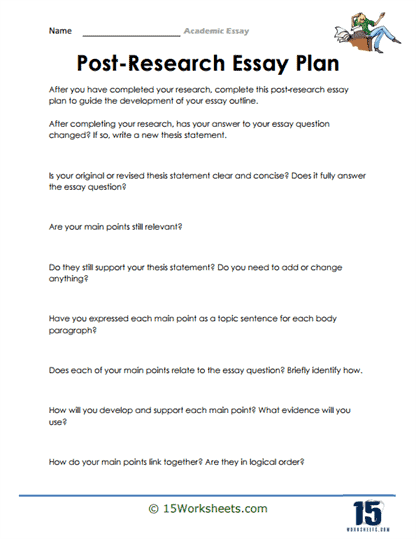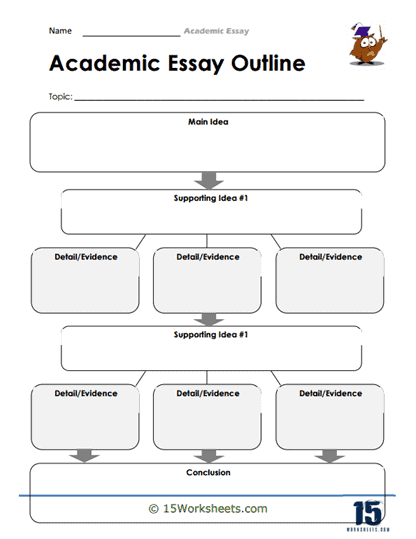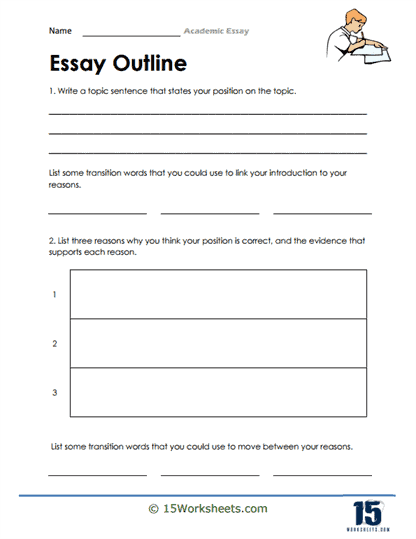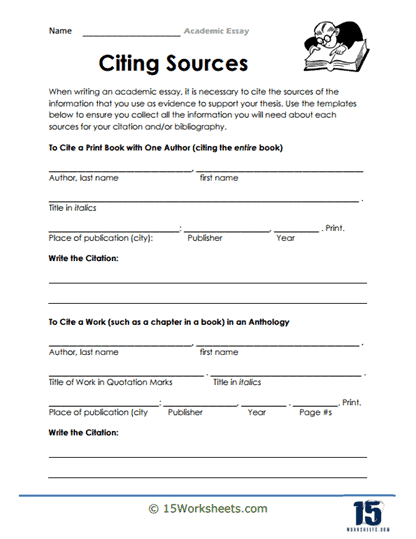Academic Essay Worksheets
All About These 15 Worksheets
Students unlock the art of academic writing with this series of 15 worksheets, designed to guide students through the process of crafting well-structured and effective academic essays. Each worksheet in this series provides a step-by-step approach to help students develop their essay writing skills, from brainstorming ideas to crafting compelling arguments and producing polished final drafts.
This series caters to students across different grade levels and academic proficiency levels, offering a range of worksheets that address various aspects of essay writing. By engaging with these worksheets, students gain the necessary tools and techniques to excel in their academic writing endeavors.
A Look At Our Individual Worksheets
Writing an academic essay is a bit like building a spaceship out of LEGO-yes, you need creativity, but you’d better follow the instructions or that sucker’s crashing in the first paragraph. The journey begins with big questions about what you actually believe and why. In Examine Your Claim, students poke their own ideas like suspicious leftovers in the fridge-what exactly is this argument I’m about to serve? Then, The Conventions reminds us that academic writing is less about sounding fancy and more about not embarrassing yourself in front of people who actually read. Don’t use “I think”; you are not an influencer. Use evidence. Use structure. Don’t say “YOLO.”
Next up, it’s all about that glorious, shining beacon of hope (or despair): the thesis statement. In Thesis Statement and Crafting a Thesis, students get to wrestle with the angel of Meaningful Insight. What’s the point? Where are we going? Why does this matter? These worksheets turn vague proclamations like “School is weird” into actual arguments like “Public school systems in the U.S. lack equitable funding, disproportionately affecting marginalized students.” That’s right-words with purpose. Then comes Define and Analyze, which dares students to slow down and clarify what they mean. If you’re arguing about “freedom,” maybe define it before declaring yourself its prophet.
But the soul of an essay is in its messy, beautiful beginnings, and that’s where the brainstorming worksheets shine. Working Out Ideas, Question the Question, Brainstorming Ideas, and Preliminary Essay Plan form the emotional montage of the writer’s journey. These pages are like the Rocky training scene, except instead of punching sides of beef, you’re circling “Is social media evil?” twenty times and finally deciding, yes, maybe, but only Instagram. Students learn to ask better questions, identify what they know, and figure out what they don’t-just before running headfirst into the thrilling void that is Research Notes.
Now that students are emotionally and intellectually unstable-er, ready-they hit the research zone. APA Citations: Books teaches that if you’re going to name-drop, you better do it right. This worksheet turns students into bibliographic ninjas, flipping titles and page numbers with the grace of citation gods. And once the facts are in, Post-Research Essay Plan helps students reassess their argument now that they’ve read actual information. Spoiler alert: it’s not always what they expected. It’s like trying to prove aliens built the pyramids and then finding out, nope, just ancient Egyptians with excellent math skills.
We arrive at the architectural phase: The Outline, Essay Outline, and Citing Sources. Here’s where students discover that structure is not the enemy, but the friend who shows up with snacks and a color-coded spreadsheet. Outlines aren’t for killjoys-they’re the invisible scaffolding of greatness. These worksheets ask, “How will you start strong? How will you not trail off in paragraph three like a deflated balloon?” and “Are you actually citing your sources or just vaguely remembering a TED Talk?” With a little luck (and a lot of red ink), students come out on the other side with something resembling an actual essay-and the scars to prove it.
How To Write Academic Essays
First, take a deep breath. You don’t need to become Shakespeare or a Nobel laureate-you just need a plan, some caffeine, and maybe a small existential crisis. Here’s your no-nonsense, slightly humorous guide to writing an essay that doesn’t make your professor weep.
Step 1: Figure Out What the Heck They’re Asking
Read the assignment like it’s a secret treasure map. Because it kind of is.
– What’s the actual question?
– Are they asking you to argue, analyze, compare, or just ramble in a scholarly tone?
– How long does it have to be? (Yes, unfortunately, 500 words isn’t always enough.)
– Are there rules? (MLA? APA? Chicago? Hogwarts formatting?)
Pro tip: If the instructions make no sense, ask your professor. They like that. It shows you’re trying. (And it delays the writing.)
Step 2: Pick a Topic That Won’t Bore You to Death
If the topic is up to you, choose something you actually care about-or at least can care about for 1,000 words.
Bad: “Climate change.”
Better: “How climate change is turning beach vacations into swamp adventures.”
Keep it focused, but not so narrow that there’s nothing to say. You want a goldilocks topic-not too hot, not too cold.
Step 3: Research (a.k.a. The Deep Scroll)
Time to pretend you’re a detective. Find legit sources-not Reddit threads or Uncle Bob’s conspiracy blog.
Look for:
Scholarly articles (Google Scholar is your friend)
Books with actual footnotes
Reputable websites (bonus points if they end in .edu or .gov)
Take notes. Copy citations as you go. Future-you will thank you.
Step 4: Craft a Thesis That Slaps
Your thesis statement is the soul of your essay. It’s your main argument-your bold claim.
Weak: “Pollution is bad.”Strong: “Air pollution in major cities is directly linked to rising asthma rates and needs urgent policy intervention.”
Make sure it’s:
Clear
Debatable
Not stolen from Wikipedia
Step 5: Build a Simple Outline (a.k.a. Your Essay’s Skeleton)
Here’s the classic structure:
A. Introduction
– Catchy hook (don’t be boring)
– Brief background
– Your beautiful thesis
B. Body Paragraphs
– Each paragraph = 1 main point
– Use evidence (quotes, stats, dramatic flair)
– Explain how this proves your thesis isn’t trash
C. Conclusion
– Restate the thesis in a cool way
– Summarize key points
– Leave the reader thinking (“Whoa, I never saw pollution that way before!”)
Step 6: Write the Thing
Now type like the wind. Don’t obsess over perfection-just get it all down.
– Use formal language but don’t sound like a robot.
– Avoid “I think,” “I believe,” or “in my humble opinion” (just say the thing!).
– Cite your sources-plagiarism is not a vibe.
Step 7: Revise Like a Ruthless Editor
Editing = where the magic happens (and where you realize half your essay is nonsense).
Check for:
Clarity: Does it make sense?
Flow: Does one idea lead to the next?
Evidence: Are you backing up your claims or just hoping no one checks?
Cut the fluff. Fix awkward sentences. If a sentence doesn’t serve a purpose, yeet it.
Step 8: Proofread (Preferably With Snacks)
Read it out loud. Seriously. You’ll catch weird phrasing, missing words, and accidental typos.
Better yet:
– Get a friend to read it.
– Use tools like Grammarly-but don’t trust them blindly.
– Take a break, then come back with fresh eyes.

